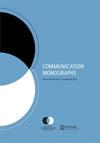马来西亚公民社会的组织间同质性与社会资本网络地位
IF 3.1
2区 文学
Q1 COMMUNICATION
引用次数: 2
摘要
组织间关系传播文献已经确定了同质性——行为者与相似的其他人形成联系的倾向——作为公民社会网络中组织之间关系形成的预测机制。本研究考察了同质性与网络结构之间的联系,这些网络结构等同于不同类型的社会资本和影响力感知。利用从马来西亚公民社会组织网络中收集的调查数据(n = 90),使用指数随机图模型和自定义行为者属性模型来测试同质性特征与网络社会资本地位之间的关系。结果表明,债券持有人和经纪人倾向于受同质性的影响,而看门人则倾向于受异性和同质性的影响。同质性还与民间社会组织相互评价对方对政府改革的影响力更大的可能性有关。本文章由计算机程序翻译,如有差异,请以英文原文为准。
Interorganizational homophily and social capital network positions in Malaysian civil society
ABSTRACT The interorganizational relationship communication literature has identified homophily – the tendency for actors to form ties with similar others – as a mechanism predictive of tie formation among organizations in civil society networks. This study examined the connection between homophily and network structures equated with different types of social capital and perceptions of influence. Using survey data gathered from a network of Malaysian civil society organizations (n = 90), exponential random graph models and autologistic actor attribute models were used to test the association between homophily characteristics and the networked social capital positions of bridging, bonding, and gatekeeping. Results showed that bonders and brokers tended to be influenced by homophily, whereas gatekeepers were influenced by heterophily and homophily. Homophily was also associated with the likelihood of CSOs rating each other as more influential on government reform.
求助全文
通过发布文献求助,成功后即可免费获取论文全文。
去求助
来源期刊

Communication Monographs
COMMUNICATION-
CiteScore
5.40
自引率
0.00%
发文量
12
期刊介绍:
Communication Monographs, published in March, June, September & December, reports original, theoretically grounded research dealing with human symbolic exchange across the broad spectrum of interpersonal, group, organizational, cultural and mediated contexts in which such activities occur. The scholarship reflects diverse modes of inquiry and methodologies that bear on the ways in which communication is shaped and functions in human interaction. The journal endeavours to publish the highest quality communication social science manuscripts that are grounded theoretically. The manuscripts aim to expand, qualify or integrate existing theory or additionally advance new theory. The journal is not restricted to particular theoretical or methodological perspectives.
 求助内容:
求助内容: 应助结果提醒方式:
应助结果提醒方式:


